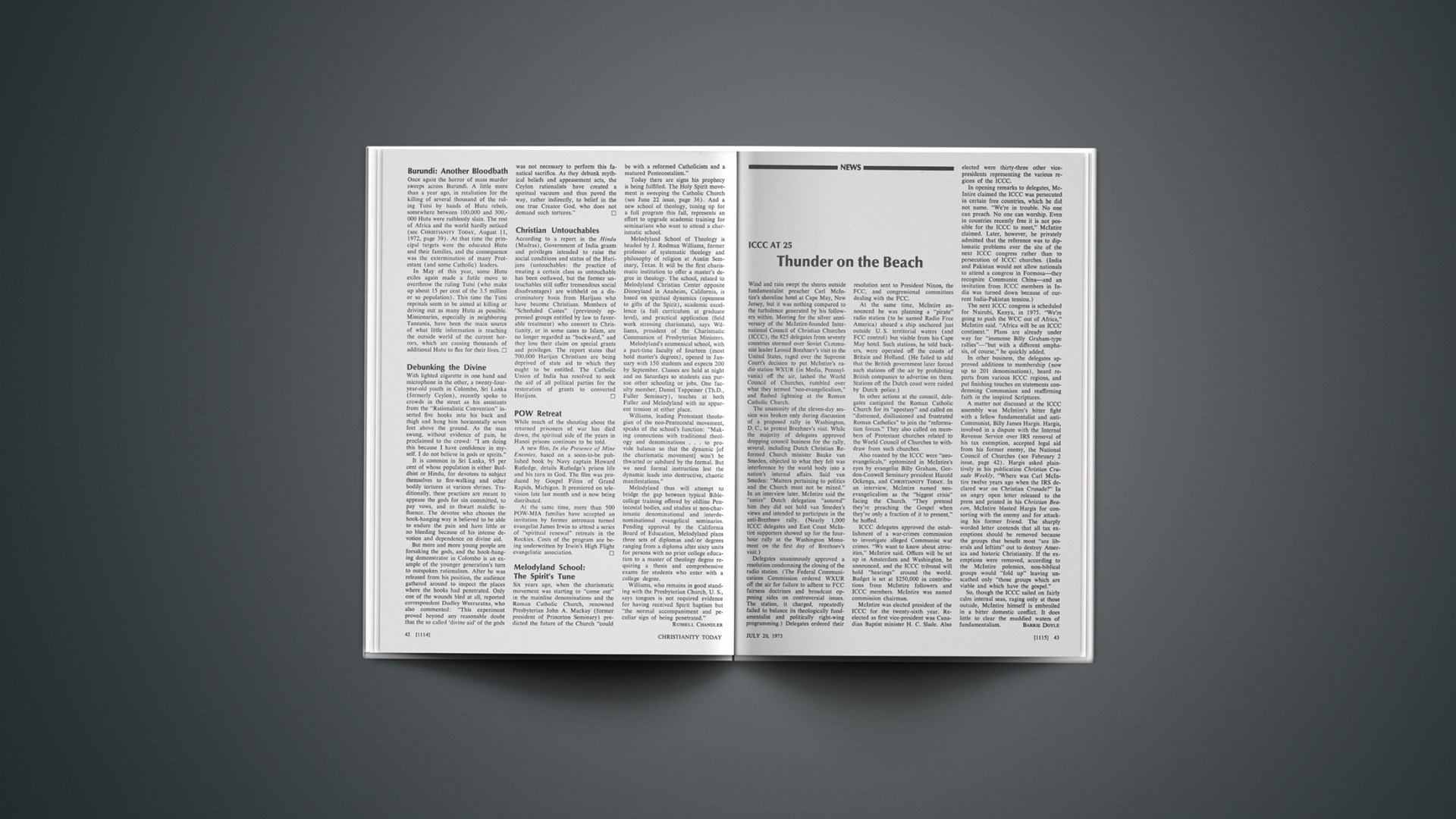Wind and rain swept the shores outside fundamentalist preacher Carl McIntire’s shoreline hotel at Cape May, New Jersey, but it was nothing compared to the turbulence generated by his followers within. Meeting for the silver anniversary of the McIntire-founded International Council of Christian Churches (ICCC), the 825 delegates from seventy countries stormed over Soviet Communist leader Leonid Brezhnev’s visit to the United States, raged over the Supreme Court’s decision to put McIntire’s radio station WXUR (in Media, Pennsylvania) off the air, lashed the World Council of Churches, rumbled over what they termed “neo-evangelicalism,” and flashed lightning at the Roman Catholic Church.
The unanimity of the eleven-day session was broken only during discussion of a proposed rally in Washington, D. C., to protest Brezhnev’s visit. While the majority of delegates approved dropping council business for the rally, several, including Dutch Christian Reformed Church minister Bauke van Smeden, objected to what they felt was interference by the world body into a nation’s internal affairs. Said van Smeden: “Matters pertaining to politics and the Church must not be mixed.” In an interview later, McIntire said the “entire” Dutch delegation “assured” him they did not hold van Smeden’s views and intended to participate in the anti-Brezhnev rally. (Nearly 1,000 ICCC delegates and East Coast McIntire supporters showed up for the four-hour rally at the Washington Monument on the first day of Brezhnev’s visit.)
Delegates unanimously approved a resolution condemning the closing of the radio station. (The Federal Communications Commission ordered WXUR off the air for failure to adhere to FCC fairness doctrines and broadcast opposing sides on controversial issues. The station, it charged, repeatedly failed to balance its theologically fundamentalist and politically right-wing programming.) Delegates ordered their resolution sent to President Nixon, the FCC, and congressional committees dealing with the FCC.
At the same time, McIntire announced he was planning a “pirate” radio station (to be named Radio Free America) aboard a ship anchored just outside U. S. territorial waters (and FCC control) but visible from his Cape May hotel. Such stations, he told backers, were operated off the coasts of Britain and Holland. (He failed to add that the British government later forced such stations off the air by prohibiting British companies to advertise on them. Stations off the Dutch coast were raided by Dutch police.)
In other actions at the council, delegates castigated the Roman Catholic Church for its “apostasy” and called on “distressed, disillusioned and frustrated Roman Catholics” to join the “reformation forces.” They also called on members of Protestant churches related to the World Council of Churches to withdraw from such churches.
Also roasted by the ICCC were “neo-evangelicals,” epitomized in McIntire’s eyes by evangelist Billy Graham, Gordon-Conwell Seminary president Harold Ockenga, and CHRISTIANITY TODAY. In an interview, McIntire named neoevangelicalism as the “biggest crisis” facing the Church. “They pretend they’re preaching the Gospel when they’ve only a fraction of it to present,” he huffed.
ICCC delegates approved the establishment of a war-crimes commission to investigate alleged Communist war crimes. “We want to know about atrocities,” McIntire said. Offices will be set up in Amsterdam and Washington, he announced, and the ICCC tribunal will hold “hearings” around the world. Budget is set at $250,000 in contributions from McIntire followers and ICCC members. McIntire was named commission chairman.
McIntire was elected president of the ICCC for the twenty-sixth year. Reelected as first vice-president was Canadian Baptist minister H. C. Slade. Also elected were thirty-three other vice-presidents representing the various regions of the ICCC.
In opening remarks to delegates, McIntire claimed the ICCC was persecuted in certain free countries, which he did not name. “We’re in trouble. No one can preach. No one can worship. Even in countries recently free it is not possible for the ICCC to meet,” McIntire claimed. Later, however, he privately admitted that the reference was to diplomatic problems over the site of the next ICCC congress rather than to persecution of ICCC churches. (India and Pakistan would not allow nationals to attend a congress in Formosa—they recognize Communist China—and an invitation from ICCC members in India was turned down because of current India-Pakistan tension.)
The next ICCC congress is scheduled for Nairobi, Kenya, in 1975. “We’re going to push the WCC out of Africa,” McIntire said. “Africa will be an ICCC continent.” Plans are already under way for “immense Billy Graham-type rallies”—“but with a different emphasis, of course,” he quickly added.
In other business, the delegates approved additions to membership (now up to 201 denominations), heard reports from various ICCC regions, and put finishing touches on statements condemning Communism and reaffirming faith in the inspired Scriptures.
A matter not discussed at the ICCC assembly was McIntire’s bitter fight with a fellow fundamentalist and anticommunist, Billy James Hargis. Hargis, involved in a dispute with the Internal Revenue Service over IRS removal of his tax exemption, accepted legal aid from his former enemy, the National Council of Churches (see February 2 issue, page 42). Hargis asked plaintively in his publication Christian Crusade Weekly, “Where was Carl McIntire twelve years ago when the IRS declared war on Christian Crusade?” In an angry open letter released to the press and printed in his Christian Beacon, McIntire blasted Hargis for consorting with the enemy and for attacking his former friend. The sharply worded letter contends that all tax exemptions should be removed because the groups that benefit most “are liberals and leftists” out to destroy America and historic Christianity. If the exemptions were removed, according to the McIntire polemics, non-biblical groups would “fold up” leaving unscathed only “those groups which are viable and which have the gospel.”
So, though the ICCC sailed on fairly calm internal seas, raging only at those outside, McIntire himself is embroiled in a bitter domestic conflict. It does little to clear the muddied waters of fundamentalism.










